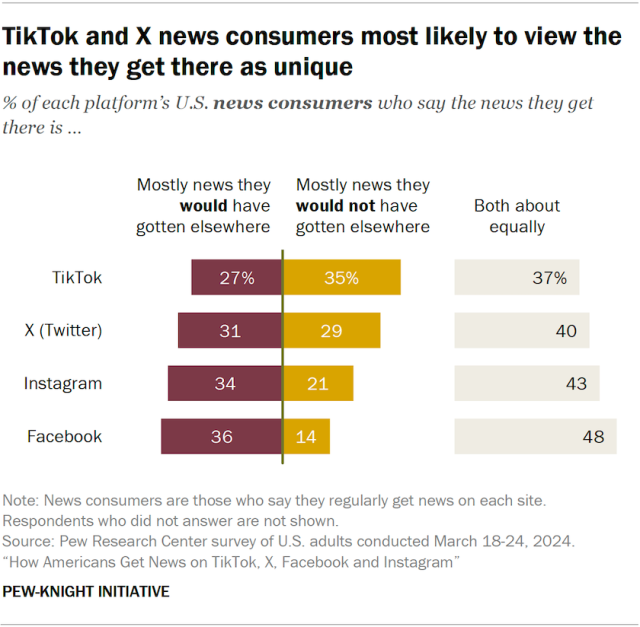☀️ Happy Thursday! The Briefing is your guide to the world of news and information. Sign up here!
In today’s email:
- Featured story: AI’s role in news content
- New from Pew Research Center: How Americans get news on TikTok, X, Facebook and Instagram
- In other news: Right-wing media face legal challenges for past election falsehoods
- Looking ahead: Washington Post considers starting a subscription-based local news product
- Chart of the week: How unique is the news seen on social media sites?
🔥 Featured story
Last week’s Briefing looked at Google’s use of artificial intelligence in search results, which may in some cases summarize news articles. But that’s not the only way people are getting news through AI: Some apps and websites use AI to create news content.
One site recently shut down while another is under scrutiny from U.S. lawmakers after each reportedly used AI to generate error-filled stories.
Americans are split over whether AI helps or hurts when it comes to people finding accurate information online. One-third of U.S. adults say AI helps more than it hurts in this regard, while 27% say it does more harm than good and 40% say they are not sure, according to a 2023 Center survey. More generally, Americans are increasingly wary of AI’s impact: 52% say they are more concerned than excited about the growing role of AI in daily life, compared with just 10% who are more excited than concerned.
🚨 New from Pew Research Center
A new Pew Research Center survey finds that how Americans get news on four major social media platforms – TikTok, X, Facebook and Instagram – varies widely.
Key findings include:
- Majorities of Facebook, Instagram and TikTok users say keeping up with news is not a reason they use the sites. X (formerly Twitter) is the exception to this pattern: 65% of X users say that getting news is a reason they use the platform.
- Still, most people are seeing news on all four platforms, especially through opinion- or humor-based content.
- News on each platform comes from a variety of sources. Those who regularly get news on Facebook and Instagram are more likely than those on TikTok and X to get news from friends, family and acquaintances.
This report focuses on news on social media. To learn about how people engage with politics on these platforms, read the companion report.
These reports are from the Pew-Knight Initiative, a research program funded jointly by The Pew Charitable Trusts and the John S. and James L. Knight Foundation.
📌 In other news
- Right-wing media face legal challenges for past election falsehoods
- Baltimore Sun’s union accuses its new ownership of scrapping ethical standards
- Journalists celebrate free call recording and transcription coming to iPhone
- Why are so many American newsrooms being led by British journalists?
- A look at Russian influence campaigns in Europe
- A newspaper at a Minnesota prison has been publishing for more than a century
📅 Looking ahead
The Washington Post is considering offering premium local content for an additional fee, according to Axios. As one executive explained, the new local news product would focus on readers with the “highest level of engagement” with the Post’s journalism.
About two-thirds of U.S. adults (66%) say they follow local news at least somewhat closely, including 22% who say they follow it very closely, a recent Center survey found. This is down from 2016, when 78% of Americans said they follow local news at least somewhat closely (37% very closely) – mirroring a decline in attention to news in general.
📊 Chart of the week
This week’s chart comes from a new Center report about news on TikTok, X, Facebook and Instagram.
Our survey asked Americans who say they regularly get news on each site whether they think the news they get there is mostly news they would have gotten elsewhere, or whether it’s news they only would have found on that site.
News consumers on TikTok (35%) and X (29%) are the most likely to say that the news they get on those sites is unique – i.e., news they would not have seen elsewhere.
👋 That’s all for this week.
The Briefing is compiled by Pew Research Center staff, including Naomi Forman-Katz, Jacob Liedke, Sarah Naseer, Christopher St. Aubin, Luxuan Wang and Emily Tomasik. It is edited by Katerina Eva Matsa, Michael Lipka and Mark Jurkowitz, and copy edited by David Kent.
Do you like this newsletter? Email us at journalism@pewresearch.org or fill out this two-question survey to tell us what you think.
